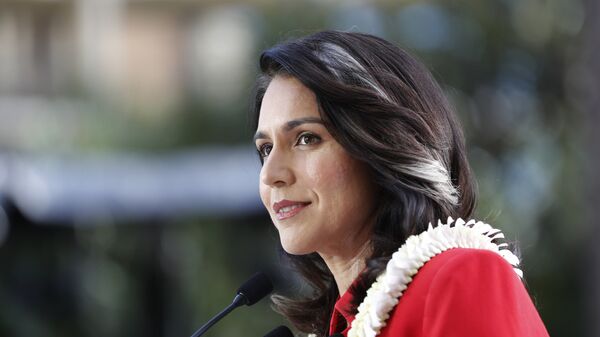In the hours following Gabbard’s appearance on the first Democratic primary presidential debate on June 26-27, analytics show she was the most-searched candidate of anybody on the stage. However, during a key part of that time, Google disabled Gabbard’s Google Ads account, barring her campaign from buying the top spot of searches for her name for a period of roughly six hours.
In response, Gabbard filed a lawsuit against Google in a Los Angeles federal court, alleging “serious and continuing violations of Tulsi’s right to free speech.”
“Since at least June 2019, Google has used its control over online political speech to silence Tulsi Gabbard, a candidate millions of Americans want to hear from,” the suit alleges. “With this lawsuit, Tulsi seeks to stop Google from further intermeddling in the 2020 United States Presidential Election.” She is also seeking $50 million in compensation for the mishap.
“Google’s arbitrary and capricious treatment of Gabbard’s campaign should raise concerns for policymakers everywhere about the company’s ability to use its dominance to impact political discourse, in a way that interferes with the upcoming 2020 presidential election,” the suit continues. “To this day, Google has not provided a straight answer - let alone a credible one - as to why Tulsi’s political speech was silenced when millions of people wanted to hear from her.”
Map: before and after the #DemDebate pic.twitter.com/7y3iNoJR1N
— GoogleTrends (@GoogleTrends) June 27, 2019
“For hours, Tulsi’s campaign advertising account remained offline while Americans everywhere were searching for information about her,” an email sent out by Gabbard’s campaign on July 25 notes. “During this time, Google obfuscated and dissembled with a series of inconsistent and incoherent reasons for its actions. In the end, Google never explained to us why Tulsi’s account was suspended.”
The dominance of tech giants over American society - and Americans’ information - has long been a major plank in Gabbard’s platform, and she has called for “breaking up the tech monopolies.”
“Google’s discriminatory actions against my campaign are reflective of how dangerous their complete dominance over internet search is, and how the increasing dominance of big tech companies over our public discourse threatens our core American values. This is a threat to free speech, fair elections and to our democracy, and I intend to fight back on behalf of all Americans,” the email states.
Gabbard’s lawsuit also alleges that Google places her campaign’s emails sent to Gmail accounts into recipients’ spam folders at “a disproportionately high rate” compared to the messages sent by other candidates.
Google spokesperson Jose Castaneda told the New York Times that Google has automated systems that flag unusual activity on advertiser accounts, such as large spending changes.
“In this case, our system triggered a suspension and the account was reinstated shortly thereafter,” he said, reaffirming the company’s nonpartisan position. However, no other candidate’s account triggered the automated suppression system.
By the time this article went to publication, Google had not replied to Sputnik’s request for a comment.
Tech giants like Google, Twitter, Facebook and Amazon have increasingly fallen into the crosshairs of politicians on both sides of the aisle, who find a rare chance to unite around a common cause of increasing oversight of how those internet companies handle users’ personal data and how they control users’ access to information.
“Google’s control over what people hear, read, watch and see is unprecedented,” Texas Senator Ted Cruz, a Republican die-hard who heads the Senate’s Judiciary Subcommittee on the Constitution, said to the company’s Vice President of Global Public Policy and Government Relations Karan Bhatia during a July 16 hearing. “With that market power, Google can and often does control our discourse.”
Republicans have long directed ire at Google’s proven political bias, particularly how it governs the appearances of search results, in ways that Gabbard’s suit strongly parallels.
"There is absolutely no question that Google's algorithms helped to swing a number of races toward the Democrats,” Dr. Robert Epstein, senior research psychologist at the American Institute for Behavioral Research and Technology, told Sputnik in a December 2018 interview, noting that "95% of contributions from Google employees go to Democrats.”
Gabbard is a Democrat, but the fact that Google is capable of shifting millions of votes with its search result placement algorithms - and does manually prune search results, as internal company documents obtained by the Daily Caller earlier this year revealed - should set all politicos on edge. If Gabbard’s claims are vindicated, it would further prove that Google’s favoritism isn’t limited to Democrats, but to specific candidates - or at least to denying the public access to the ideas of unfavored candidates like Gabbard.
The Hawaii representative has criticized many mainstream Democratic positions, particularly by her opposition to wars against Syria, Iran and Venezuela, and drawn the ire of liberals - and the respect of some conservatives - for her anti-interventionism, which she justifies with her experience as a combat veteran in the US war in Iraq.




